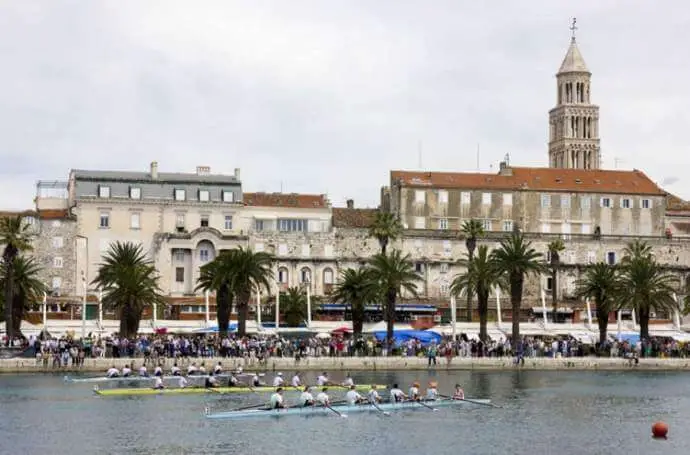Namely, the 19th International Sveti Duje Regatta will not be held for the second year in a row due to epidemiological measures.
This rowing regatta has established itself as a recognizable sports and tourist attraction that greatly contributes to the international promotion of Split and the University of Split. On the first day on the race track in Spinut, spectators have the opportunity to see the clash of the best European university eights, which increased from year to year. At the same time, Spinut is the only place where the original crews of Oxford and Cambridge take part, after rowing in the famous Thames race in London in April. Split is technically the only place for a rematch, which gives this regatta additional charm.
The second day of the regatta revives the legends of Split, Oxford, and Cambridge at the city port on the 222-meter long regatta track. The sprint discipline was created for spectators gathered on the Riva. In addition to being accepted as a social event with a series of fun activities, the Sveti Duje Regatta has in recent years been profiled as an event that connects established businesses and professionals from different spheres and parts of the world.
Luka Grubor, an Oxford legend, a gold Olympian in Sydney, and a member of the Sveti Duje International Rowing Regatta committee, spoke about postponing the event this year for Dalmacija Danas.
“The epidemiological situation in Croatia and the whole of Europe is such that it has not left us much choice. We planned to hold the regatta respecting all measures by adapting the “bubble” system, which proved to be a good solution in several sports competitions. However, the successful holding of this regatta largely depends on the possibility of university crews arriving by plane to Croatia. Croatia’s air connections with the rest of Europe are poor at this time. Before COVID-19, Easter meant the beginning of the tourist season and introducing new flights to Split. It’s different now. Eights come from more than ten European countries, and it would not be possible for everyone to come to Split during the regatta, so we decided to postpone the regatta to September. The tradition and size of this regatta do not allow it to be held in a truncated edition. We are aware of how much this regatta means to university eights, and we know that they enjoy participating in this regatta not only because of the beauty of Split but also because of the strong competition.”
Why September?
“Just as early May is the end of the winter rowing season and the time just after the boat race, late September is the beginning of the fall training and racing season. It is ideal for a new generation of university teams to weigh in before they get into tough preparations for next season. An additional reason is the cancellation of the European University Games, which were supposed to be held in Belgrade this year, so the interest in our regatta has further increased. Students are eager for quality competition and socializing. We chose the weekend of September 25th and 26th for the date. That is the week before the start of the academic year, the student teams will then already be together, and even the individuals who will be competing in the Olympics this summer. There was an idea to hold the Regatta a week earlier, in the same week that marks the Split Sports Day (note in memory of the opening day of the 8th Mediterranean Games – MIS 79). Still, that weekend the Croatian Rowing Championship is held in Zagreb. September will definitely be this year’s rowing month in Croatia.”
The Split Marathon and the Legend Regatta on the same day?
“Our projects share the same values. We are in contact with the organizers of the Split Marathon, and there will be no overlap of programs. The passage of all runners through the finish line on the Riva is expected at 11:30 at the latest, and the Race of Legends will not start until noon. A real sports festival awaits the people of Split this weekend. It will pay off to go down to the Riva and enjoy that day, as the day before on the pirate pontoon when the university eights row.”
The race will be in a different guise this year?
“The Boat race did not run at the traditional Championship Course in London this year to prevent people from gathering along the river. Last year there was no rowing at all due to epidemiological reasons. Under normal conditions, the race attracts over 400,000 spectators along a nearly 7-kilometer-long regatta course. The race was transferred to the Great Ouse River in a rural part of England, near the town of Ely about twenty kilometers from Cambridge. Cambridge won both the men’s and women’s categories. It is the second time in the long history of the race that it paddled on this river. It was first held there in 1944 during World War II when Oxford was more successful. This is proof of how difficult it is to plan any event for the duration of these extreme and limiting living conditions, but traditions like the Boat Race always find a way and a path. This tradition and the fact that this weave has been held 166 times regardless of historical challenges and adversities brings popularity to the Boat race. I must point out that the organization of the Boat Race this year is a great inspiration to our team because of everything they have done to maintain their sporting rivalry and the continuity of the race. It is amazing to what extent they have worked out the details to prepare, and the race itself meets all the epidemiological measures.
The contribution of this event to the development of Croatian tourism certainly cannot be measured by the number of realized overnight stays, as in the cases of other sports events. The organizers point out that 25% of the participants in this Regatta return to the Adriatic at least once a year, and 12% of the competitors, mostly “Legends,” have visited Split at least 10 times in the last 7 years. Last year obviously left enough time for the organizers to think. They announce that the focus of the Regatta will always be on rowing. Still, they also plan to organize an international conference emphasizing the connection between amateur sports, professional careers, and the business world.
Namely, many rowing legends and rowing and university alumni, in general, have interesting and colorful careers after sports. It happened spontaneously that this Regatta regularly brings together top experts from several sectors, from investment to medicine, and has become a true platform that brings together top professionals. The co-founders of Facebook, the Winklevoss brothers, the current owners of the Gemini Exchange, Ante Kušurin, the vice president of the American fund One Equity Partners, and many others also took part in this sporting event.
This loyalty of our participants to Croatia and Split, the profile of such visitors, strong promotion in specific markets is a significant criterion that we must consider when mentioning the impact of the sports community on Croatian tourism or other sectors of the economy. The promotion of Croatia in the international business network is something in which we as an event can be the best. The plan is to establish a “Legends Club,” which includes sports legends who rowed at the regatta in Split, and alumni are Oxford, Cambridge, and other universities. The “Legends Club” will be the organizer of this international conference,” concluded Luka Grubor.
To follow the latest sports news in Croatia, follow TCN’s dedicated page.
To learn more about sport in Croatia, CLICK HERE.









